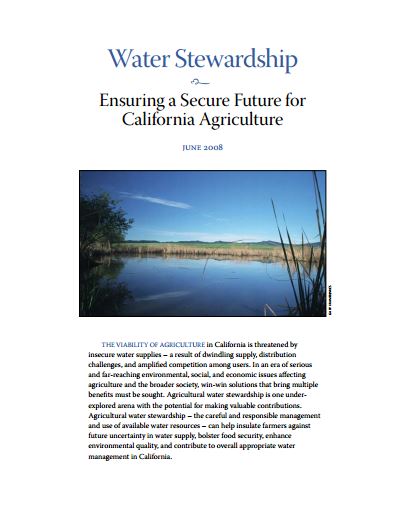Water Stewardship: Ensuring a Secure Future for California Agriculture
On June 30, 2008, several agriculture support organizations issued a joint report calling for producers and policy-makers to recognize the importance of agricultural water stewardship as a key element of a strategy to better manage the state’s dwindling water resources and reduce farmers’ reliance on insecure inputs.
Click Here to Download PDF
Summary
Looming Water Crisis Spurs Action
June 30, 2008 – Agriculture Support Groups Call For Agricultural Water Stewardship to Protect State Food Production
Several agriculture support organizations today issued a joint report calling for producers and policy-makers to recognize the importance of agricultural water stewardship as a key element of a strategy to better manage the state’s dwindling water resources and reduce farmers’ reliance on insecure inputs. The paper, “Water Stewardship: Ensuring a Secure Future for California Agriculture”, outlines the case for water stewardship and lays the foundation for a water stewardship strategy. The report was released by the Agriculture and Land-Based Training Association, the California Institute for Rural Studies, the Community Alliance with Family Farmers, the Ecological Farming Association, The Polaris Institute, and the WATER Institute of the Occidental Arts and Ecology Center.
“Water stewardship is about optimizing water management and reducing inputs through on-farm practices that better capture, retain and distribute water, reduce consumptive use, enhance efficiency and recycle water,” said Craig Ficenec, a spokesperson for ALBA, a co-author of the report. “Growers can increase the resiliency of their operations by reducing their dependence on increasingly scarce and expensive water inputs.”
Drought and a decline in the Sierra snow pack have combined with recent court orders cutting back water transfers to protect endangered fish species and other factors to restrict the water available for producing the nation’s food. “In California today, we are facing unprecedented economic, social, and environmental problems and diminishing resources with which to cope. Agricultural water stewardship is one of those tools we have available in our toolbox that affords multiple benefits at once – for example, an economic buffer for producers, improved food security, enhanced wildlife habitat, and better water quality,” said Brock Dolman, Director of the OAEC WATER Institute.
“Water Stewardship: Ensuring a Secure Future for California Agriculture” includes principles to guide agricultural water stewardship activities and proposals for the research, on-farm practices, policies, and collaborations necessary to implement water stewardship across the state. The authors consulted with dozens of experts from state government agencies, water advocacy groups, production agriculture, and technical agencies to inform the perspective. “Water Stewardship” was launched to spark dialogue and action toward water policies and practices that build collaboration rather than fuel competition. In this time of increasing competition for water resources, ideas like this have the power to create meaningful and lasting change.
Media contact: Katy Mamen, The Polaris Institute
Phone: (707) 874-1317
Fax: (707) 874-1558
E-mail:






